
Insects in the family Tettigoniidae are commonly called katydids, or bush crickets. They have previously been known as "long-horned grasshoppers". More than 6,400 species are known. Part of the suborder Ensifera, the Tettigoniidae are the only extant (living) family in the superfamily Tettigonioidea.

The family Gryllidae contains the subfamilies and genera which entomologists now term true crickets. They belong to the Orthopteran subfamily Ensifera, having long, whip-like antennae and has been reduced in terms of the older literature, with taxa such as the spider-crickets and allies, sword-tail crickets, wood or ground crickets and scaly crickets elevated to family level. The type genus is Gryllus and the first use of the family name "Gryllidae" was by Walker.

The family Prophalangopsidae are insects belonging to the order Orthoptera. There is only one extant genus in North America, where they are known as grigs, four genera in Asia, and many extinct genera.
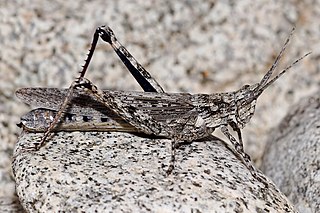
The Acrididae are the predominant family of grasshoppers, comprising some 10,000 of the 11,000 species of the entire suborder Caelifera. The Acrididae are best known because all locusts are of the Acrididae. The subfamily Oedipodinae is sometimes classified as a distinct family Oedipodidae in the superfamily Acridoidea. Acrididae grasshoppers are characterized by relatively short and stout antennae, and tympana on the side of the first abdominal segment.

Ensifera is a suborder of insects that includes the various types of crickets and their allies including: true crickets, camel crickets, bush crickets or katydids, grigs, weta and Cooloola monsters. This and the suborder Caelifera make up the order Orthoptera. Ensifera is believed to be a more ancient group than Caelifera, with its origins in the Carboniferous period, the split having occurred at the end of the Permian period. Unlike the Caelifera, the Ensifera contain numerous members that are partially carnivorous, feeding on other insects, as well as plants.
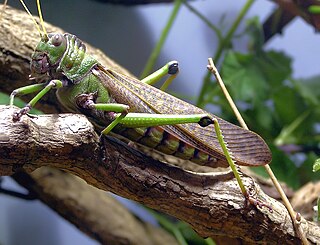
The Romaleidae or lubber grasshoppers are a family of grasshoppers, based on the type genus Romalea. The species in this family can be found in the Americas.
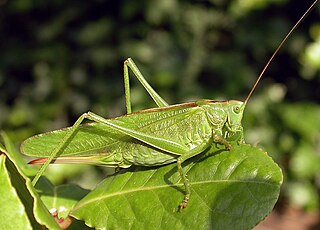
The Tettigoniinae are a subfamily of bush crickets or katydids, which contains hundreds of species in about twelve tribes.

The Phaneropterinae, the sickle-bearing bush crickets or leaf katydids, are a subfamily of insects within the family Tettigoniidae. Nearly 2,060 species in 85 genera throughout the world are known. They are also known as false katydids or round-headed katydids.
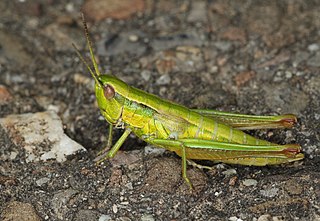
Gomphocerinae, the slant-faced grasshoppers, are a subfamily of grasshoppers found on every continent but Antarctica and Australia.
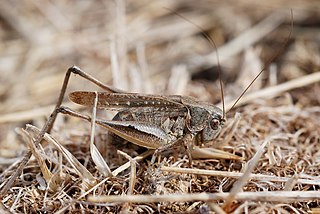
Platycleis is a genus of bush crickets described by Fieber in 1853, belonging to the subfamily Tettigoniinae. The species of this genus are present in Europe, North Africa and temperate Asia.

Mecopodinae, the long-legged katydids, are a subfamily of bush crickets found in western South America, sub-Saharan Africa, and Asia. In Asia, the distribution includes India, Indochina, Japan, the Philippines, and Malesia to Papua New Guinea and Australasia, including many Pacific islands.

The Copiphorini are a tribe of bush crickets or katydids in the family Tettigoniidae. Previously considered a subfamily, they are now placed in the subfamily Conocephalinae. Like some other members of Conocephalinae, they are known as coneheads, grasshopper-like insects with an extended, cone-shaped projection on their heads that juts forward in front of the base of the antennae.

Grylloidea is the superfamily of insects, in the order Orthoptera, known as crickets. It includes the "true crickets", scaly crickets, wood crickets and other families, some only known from fossils.

Conocephalinae, meaning "conical head", is an Orthopteran subfamily in the family Tettigoniidae.

The Cyrtacanthacridinae are a subfamily of Orthoptera: Caelifera in the family Acrididae. They are sometimes referred-to as bird locusts, criquets voyageurs in French-speaking Africa, and Knarrschrecken in German.

Tettigoniidea is an infraorder of the order Orthoptera, with six extant families.

Romaleinae is a subfamily of lubber grasshoppers in the family Romaleidae, found in North and South America. There are more than 60 genera and 260 described species in Romaleinae.
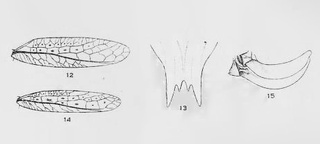
Stictophaula is a genus of Asian Tettigoniidae of the tribe Holochlorini within the subfamily Phaneropterinae. They are found in Indo-China, China, and Malesia.
Rammea is an extinct genus in the Tettigoniidae, comprising a single species, Rammea laciceps. The type locality is Böttingen in Germany. It is the only genus and species in the subfamily Rammeinae.
Protogryllidae is an extinct family of crickets in the order Orthoptera. There are about 8 genera and more than 20 described species in Protogryllidae.

















